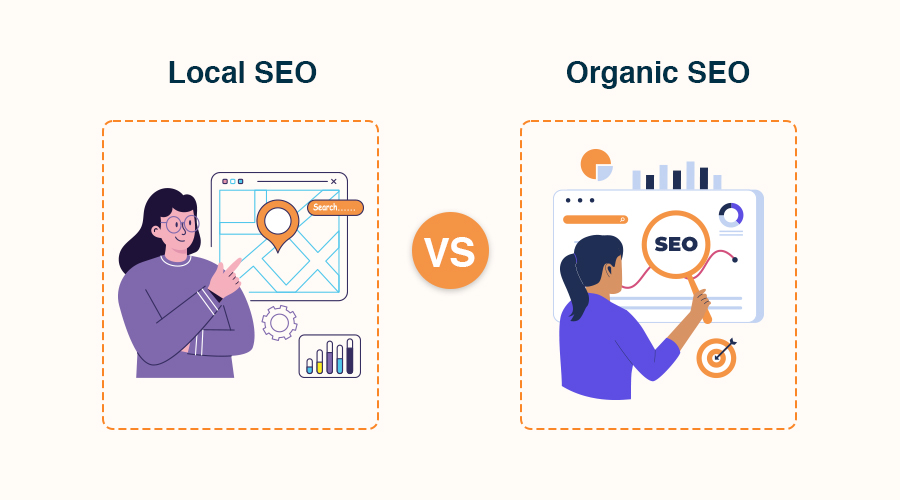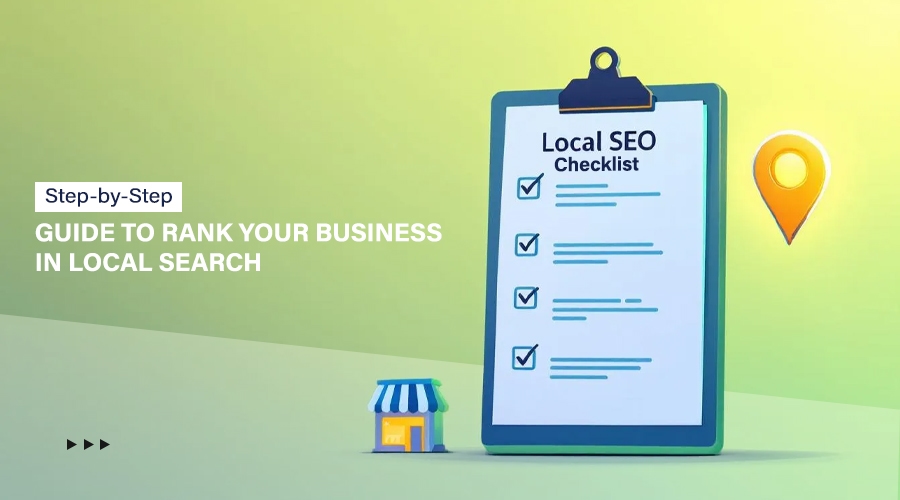Did you know that 68% of online experiences begin with a search engine? It’s no surprise, then, that SEO still remains one of the most reliable sources of inbound leads.
Businesses of all sizes continue to invest in SEO because it works. It boosts online visibility and attracts high-intent traffic and makes the role play as a premier technique in digital marketing.
While 22.6% of local searches account for web traffic, 94% of clicks come from organic search results. You may have already read various points on the debate on local SEO VS organic SEO. However, there should be no second thoughts that they both play a crucial role in helping your business get found online.
Understanding the difference between SEO and local SEO can help you attract the right traffic and achieve faster growth.
Let’s break down the two concepts in this blog to gain a better understanding on what is the difference between Local SEO and Organic SEO? Which one does your business needs?
What is Local SEO for Businesses?
Local search engine optimization, also known as local SEO, is a targeted form of SEO. It enhances the online visibility of businesses in demographic-related searches.
If you have ever Googled a service “near me” and instantly seen a map with top-rated businesses pops up, you have already experienced local search optimization.
Thinking of how does local SEO work? It will help your business appear in the map pack and local listings. So, whenever people with an intent search for services or products in a specific location, the search engine will suggest those locally ranked pages to them.
What are the core components of Local SEO?
Local Keyword
Local keywords are actually those phrases that reflect the intent of those local customers. Some of the local SEO terms are the words that customers type into search bars. Some also include a specific location and relevant long-tail phrases to clearly reflect local intent.
Google Business Profile Optimization
Discussions on Google My Business vs. SEO reveal that they share many similarities, highlighting the differences that set local SEO apart from organic SEO. An optimized GBP has complete and up-to-date business hours, services, locations, fresh photos, and more ratings and reviews. Always remember that the more detailed and consistent the GBP is, the better your chances of showing up in local search and on Google Maps.
Local Listings and Citations
Local listings and citations on local business online directories help build consistent NAP (Name, Address, Phone number) across the web. So, your online presence can give a trust signal to Google and its users.
Online Reviews
Customer reviews do more than build trust. They impact your local rankings. Encourage happy customers to leave reviews and always respond to feedback (good or bad). When you reply to these reviews, it fosters active engagement with users and demonstrates to Google (and others) that your business cares.
Local Content
Creating blogs, website copies, infographics, and user-generated content boasting local keywords or on the topic that talks about a specific community’s problem. Localized content signals relevance and helps you connect with your real-life neighbors online.
Localized Service Pages
Localized service pages as tailor-made landing spots for each area you serve. These pages include local keywords, neighborhood-specific references, and even testimonials from nearby clients.
Advantages of Local SEO for Businesses
Bring Local Customers
Local SEO helps business shows up on targeted searches for specific geographical areas. It puts a company in front of people who are literally down the street and ready to buy, driving local customers.
Boost Online Presence in the Local Market
Local SEO optimization establishes a consistent visibility on the online marketplace. More people will be able to discover your business through regional searches.
Shows Up on the Google Map
A local SEO-optimized business appears on the local map for high-intent searches, attracting people who need the products or services related to your brand at the moment.
More Qualified Leads and Conversion
Local searchers are always in the decision mode. For instance, whether they want to compare or visit a specific spot. They are not just browsing. Hence, this local traffic is likely to bring the most qualified leads and high conversion rates for business.
Helps Businesses Stand Out
Google prioritizes relevance and proximity in local searches, which means being local actually gives you an edge over national chains in the local market.
Local SEO Challenges
When you study the local SEO challenges, you will definitely gain insight into the discussion on local SEO vs. organic SEO.
The disadvantages of local SEO that create challenges are:
Only Target a Specific Area
Local SEO is great if you want local traffic, but it also means you are limited to people in your immediate vicinity.
Requires Offline Presence
For local searches, having a physical location is crucial. Hence, a local SEO strategy does not work for every type of business.
Tough Competition in Populated Areas
If you are in a densely populated city with numerous businesses offering the same service, standing out can be particularly challenging.
Negative Review Management Hurdles
A single negative review or low rating can also make customers suspicious about their trustworthiness.
What is Organic SEO for Businesses?
Organic search engine optimization or simply also refers as Organic SEO in the business landscape. It shows up the businesses organically in the search results with no paid push to enables companies to reach a broader audience.
Talking about how organic SEO works? This process is lengthy as it is not limited to certain specific locations. It is the most significant difference between SEO and local SEO. The process involves competitive research, keyword research, on-page optimization, UX/UI and technical SEO, backlinks, and content creation. The aim is to establish a consistent brand reputation organically across various channels, allowing the inflow of leads to occur.
What are the Core Components of Organic SEO?
Keyword Research
Keyword research is the process of finding keywords that prospects are typing into the search bars. You will need these keywords to optimize the business website’s on-page elements, such as meta tags, headings, URLs, content, and other online profiles.
On-Page Optimization
The way you use keywords on each page is referred to as on-page SEO optimization. To be honest, this is not the whole of the on-page SEO. It covers the complete SEO process of a website to make it a well-performed well-performing asset that drives quality leads.
Technical SEO
From website architecture and HTTPs to crawlability, broken links, and improving mobile responsiveness, a technical SEO takes care of every need.
User Experience (UX)
UX takes care of things like easy navigation, an intuitive UI, faster loading times, and clear call-to-action buttons so that users can interact with our site seamlessly and enhance engagement rates.
Backlinks
High-quality backlinks from authoritative sites don’t just drive traffic; they signal to search engines that your content is valuable and trustworthy. That kind of signal is a significant factor for SEO rank and domain authority.
NEEAT Content Creation
NEEAT content creation has become the backbone of organic SEO. It stands for creating blogs, articles, videos, podcasts, and any form of content that is notability sourced and showcases experience, expertise, authoritativeness, and trustworthiness.
Advantages of Organic SEO
Target a Massive Customer Base
SEO targets a broad audience base. It helps a local brand expand its reach to serve nationally and globally.
Enhance Brand Credibility and Awareness
Customers remember and rely on websites that are highly ranked in organic search results. They fear spam and do not respond to paid promotions.
Long-Term Business Benefits
Organic SEO is a winner as it saves marketing costs in the long run and drives sustainable business growth.
Organic SEO Challenges
Organic SEO has some practical challenges. You should know them to understand: What is the difference between local and organic SEO with more clarity!
Highly Competitive Keywords
As organic SEO does not need specification as local SEO, many keywords are highly competitive. Even more than keywords, it puts you in competition with big-name brands that have years of domain authority and a wealth of high-quality original content.
Longer Time
Search engines need time to crawl, understand, and trust your content; only then can organic SEO bring a rank, which is a time-consuming process.
Diverse Strategies
SEO encompasses a broad range of aspects, including on-page optimization, keyword research, technical SEO, link building, search engine optimization, and more diverse strategies.
Local SEO VS Organic SEO: Which is Better for Your Business?
Choosing between Local SEO and Organic SEO is not about picking a single strategy. Instead, it’s about matching the strategy to your business type, your customers, and how they search for what you offer.
So, when the organic SEO is a right fit for your business:
- You offer online services or products
- Does not need to show up on the local searches
- Have a broader audience base searching for values and pricing comparison [ especially the B2B brands]
So, when the local is the right for your business:
- Your customers need to visit the storefront
- Need to show up on search results of local intent
- Need to appear on the local map pack
What is the Difference Between Local and Organic SEO?
Local SEO helps businesses with physical presence to show up to the right people. On the other hand, organic SEO helps business growth for online brands or those focusing on massive expansion beyond a specific locality.
When to Combine both Local And Organic SEO?
Some businesses don’t fit into a single category. They may need both organic and local strategies. When businesses combine both local and organic SEO, they will gain more insights to support each strategy more effectively. Organic SEO will boost the broad reach, while local SEO enhances the conversation rates. In fact, local Search engine optimization will help organic SEO, as having separate local SEO strategies for multiple locations will strengthen your brand’s SEO rank in the overall market. On the other hand, the on-page optimization and NEEAT content will give more value to local customers with clear intent.
Wrapping Up the Discussion on Local SEO vs Organic SEO
Local SEO is your go-to if you’re trying to show up for real people in real places. If your customers walk in, call, or book nearby, it’s precisely the marketing tool you’re looking for in your business. On the other, Organic SEO is a long game. It’s for reaching people based on topics, questions, and needs, regardless of their location. It depends on thought leadership and trust-building.
Protips:
They are both tools; how, when, and why you should use them should totally depend on your business strategy, goals, and targets.
Frequently Asked Questions
What is the difference between local SEO and national SEO?
Local SEO is all about helping your business appear in location-based searches, such as "plumber near me" or "salon in Brooklyn." It's best for companies with physical locations or regional service areas.
National SEO is geared toward ranking across an entire country or broader audience without focusing on any specific location. It's ideal for online businesses, SaaS companies, e-commerce businesses, or companies looking to reach a nationwide customer base.
What is the difference between local SEO, organic SEO, and paid search?
Local SEO focused on ranking in the search engine result page for local intent searches. Organic SEO helps a business appear organically for non-targeted, generic search terms. Paid search provides instant visibility by displaying promoted results on targeted search queries.





